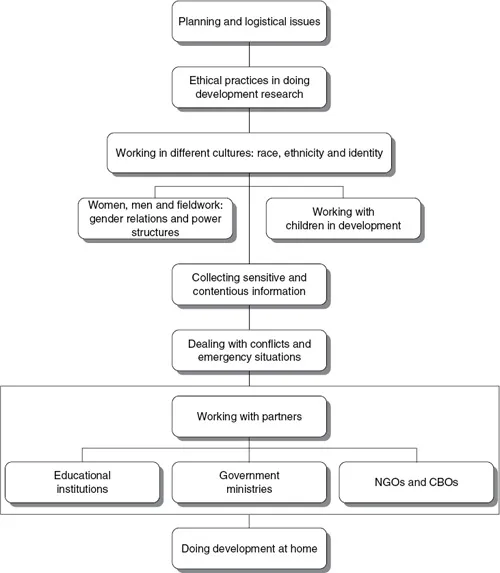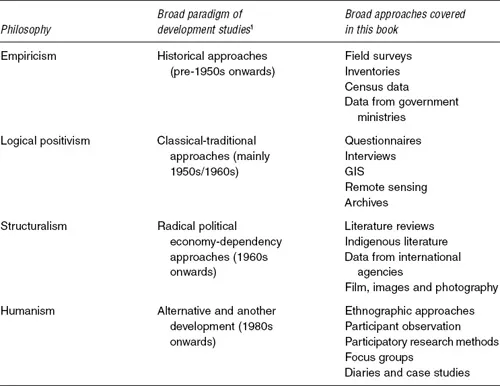![]()
Part I
Introduction
![]()
1
The Raison d’être of Doing Development Research
The aim of Doing Development Research is to provide a comprehensive introduction to the process of undertaking research in the multi-and interdisciplinary field of development studies. This volume seeks, therefore, to provide the bases for a thorough initial training for anyone aiming to carry out research in, or on, developing countries. In this context, the geographical category ‘developing countries’ is to be interpreted in the broadest of fashions. This geographical signpost might more properly be referred to as ‘overseas’, referring to cases where somebody is researching in an area, region or culture other than the one in which they grew up, or with which they are now familiar. But we do not preclude doing development work in, or on, one’s own country, following the premise that development is change in either positive or negative terms, and thereby occurs in all localities and regions to a greater or lesser extent (see Brookfield, 1975; Potter et al., 2004).
Having said this, although it is hoped that the volume will address the concerns of practitioners and consultants working on ‘hands-on’ or applied development issues, the book is primarily designed with the needs of undergraduate and postgraduate students to the fore. For generations of students, the requirement that they should prepare a dissertation or thesis has represented their first professional-academic contact with doing development research at first hand, and this represents the starting point for Doing Development Research. We assume, therefore, that the person aiming to undertake development research has attended introductory courses and read the background literature (see Chapters 22 and 28) on development theory and practice. We also hope that as part of their general undergraduate or postgraduate training they will have read a little about different research methods and the ways in which data can be collected and analysed.
The volume brings together a range of experts who have extensive first-hand experience of undertaking overseas research. It starts from the premise that overseas development is a more complex, personal, professionally demanding and nuanced experience than most manuals on research methodology acknowledge. It follows that at the outset of their work, starting students need all the help and assistance they can get. Doing Development Research aims to bring a much-needed cross-cultural perspective to the issues surrounding working overseas.
Doing Development Research enters a field where there are already some very good books and our intention has been to complement these, both in terms of the level of treatment and the subject areas covered. For example, a very helpful volume is provided by Scheyvens and Storey (2003). Their practical guide to doing development fieldwork considers the nature of quantitative and qualitative research at the outset, before the major parts of the book deal with preparing to go into the field, the eventualities of actually working in the field and, subsequently, the issues involved in leaving the field. Overall, there is a strong and much needed emphasis on the researchers’ positionality while preparing for, completing and acting on fieldwork, which will directly influence the research process and outcomes. We envisage that our readers who are strongly fieldwork-based may well progress to use Scheyvens and Storey (2003), having first consulted Doing Development Research. The same is true of several other books that deal primarily with the issues surrounding the completion of fieldwork in developing countries, like Robson and Willis (1997) and Devereux and Hoddinott (1992).
Several other very good books, while covering more than fieldwork logistics and methods, are distinguished by the fact that they are primarily aimed at the development practitioner – that is those professionals who are involved in implementation projects and consultancy research, etc. Laws, Harper and Marcus (2003) concentrate on topics such as quality issues in research, organizing a brief, approaches to evaluation, re-evaluating research for development work, as well as managing impacts. Mikkelson (2005) takes a very strongly participatory view of research and her book is aimed primarily at practitioners. Other books are avowedly aimed at postgraduates, as for example is the case with those by Robson and Willis (1997) and Scheyvens and Storey (2003).
In contrast, Doing Development Research endeavours to provide a clear overview for the beginning student – whether undergraduate or postgraduate. How can they set about their work – what published secondary data are already available? How can they make use of archives? (see Chapter 25) How can the literature on the chosen topic be reviewed? (see Chapter 22) How can they use the internet and other innovate sources such as images, films and photography to aid their research endeavours? If they are going into the field, what practical and logistical issues do they face? (see Chapter 2) What ethical factors are to be borne in mind (see Chapter 3), and what are the special concerns of working across lines of race, ethnicity and identity? What about gender issues and the special requirements of working with children – what special considerations do these entail?
As we detail more fully in the next section, Doing Development Research covers more than fieldwork (logistical issues, working in different cultures, gender issues in fieldwork, using interpreters, field surveys, interviews, focus groups and questionnaires, etc.). The volume considers doing development research not only overseas in the field, but also doing development ‘at home’. This is specifically covered in Chapter 12. But Doing Development Research also covers this important topic in respect of using data from international agencies, using the World Wide Web for development research and other secondary sources, such as remote sensing, GIS, census data, archives, indigenous literature, etc. Working with partners such as educational institutions, government departments and ministries, non-government organizations and community-based organizations is also covered under this wider remit.
Structure and content
After the brief introduction and overview of the aims and scope of Doing Development Research provided in this chapter, which comprises Part I of the volume, the book is divided into two principal sections (Parts II and III):
The strategic issues involved in planning and executing sound research are first surveyed in Part II of the book (see Figure 1.1). The chapters in this part cover both working in the field and working via secondary sources. It aims to introduce readers to both the practicalities and the realities of undertaking development-oriented research.
Part III then overviews the main ways in which information and data can be collected in carrying out development-oriented research. This is designed to assist with selecting appropriate methods. Part III is itself split into three sub-parts:
Figure 1.1 The main strategic issues in planning sound research dealt with in Part II of Doing Development Research
- Section (i) deals with methods of social research by which data can be collected at first hand. These chapters also cover associated forms of analysis, where these are relevant. However, the primary aim of Doing Development Research is not to cover statistical and other forms of data analysis. These issues are covered in far greater detail in books written for this purpose (for example, see Kitchen and Tate, 2000; Robinson, 1998).
- Section (ii) deals with how existing knowledge and sources can be used to inform analyses of development issues. Too often these can be forgotten in the rush to collate new and relevant data. This section also makes a valuable contribution in focusing attention on up-to-date, state-of-the art innovative approaches such as those afforded by the use of the internet, using images, films and photography, and data from international development agencies such as the United Nations and World Bank.
- Section (iii), consisting of two chapters, points the way in terms of how research can be written up effectively, and how the results of research can be disseminated professionally. This final section is not a substitute for texts which deal specifically and comprehensively with how to write up the results of research. Such guides exist for the undergraduate (Walliman, 2004), for Masters candidates (Hart, 2004), with respect to theses and dissertations in general (Glatthorn and Joyner, 2005; Oliver, 2003; Roberts, 2004; Rudestam and Newton, 2000), and for the doctoral student (Craswell, 2004; Wellington et al., 2005). Rather, this section provides a starting point to get readers thinking about such issues and hopefully to refer to the specialist texts that exist.
Throughout, Doing Development Research tries to maintain a basically common-sense approach and adopts a much needed cross-cultural perspective. The book seeks to use straightforward language to guide those doing overseas research through the choice of an appropriate set of research methods, the implementation of the research, and how to communicate the findings to a range of audiences (see Chapter 30 and 31).
Doing Development Research and paradigms of development
One of the main reasons that we regard Doing Development Research to be so necessary is that development studies and associated research have been, and still are, characterized by a multiplicity of philosophical approaches and associated epistemologies. By an epistemology, we mean theories as to how we find out about the world. Different development agendas reflect different political, economic, social, cultural, ethical and even moral and religious goals (Cowan and Shenton, 1996; Potter et al., 2004; Power, 2003; Rapley, 1996). Thus, thinking about development has shown many sharp twists and turns over the past 150 years.
Further, the various ideas about development that have taken centre stage have not commanded attention in a strictly sequential manner. In other words, as new sets of ideas about development have come to prominence, earlier theories and models have not been totally discarded. For example, the right wing of the political spectrum have held on to free-market policies and have re-promulgated them as part of the ‘New Right’. Equally, even given the near total collapse of state socialism since 1989, Marxist-inspired views and theories still pervade many areas of development thinking. So, as argued by Potter et al. (2004), theories and strategies of development have tended to stack up upon one another. Thus, Hettne (1995: 64) drew attention to the argument that theories of development in the social sciences ‘accumulate rather than fade away’.
In addition, it is clear that over time different sets of thought about development have been associated with different philosophies of science and associated epistemologies. And at each stage, these different approaches have therefore been associated with different views as to how we set about finding out about the world, by means of collecting data and evidence (see Table 1.1). Naturally, this broad relationship between sets of thinking about development and linked methods has not been a perfect or mechanical one, for the reasons just explained. As we have said, old theories of development never die – in fact, they don’t even seem to fade away (Potter et al., 2004). So, by extension, the approaches to finding out that have been associated with different theories of development are also still in currency. As a broad generalization, early approaches stressed development as economic growth and therefore emphasized quantitative approaches. Later, more humanistic approaches to development saw the rise of participatory and qualitative lines of investigation, with the aim being to put fewer words into respondents’ mouths and to listen more effectively (see Chapter 18).
Table 1.1 The broad association between philosophies of science, paradigms of development and the broad approaches covered in this book
Broadly speaking, the earliest approaches in any discipline tend to be empiricist. They subscribe to the view that we find out about the world by observing what has happened and how it is structured. In development studies, this has meant looking at what history tells us about how countries and regions have developed and changed through time. As shown i...






